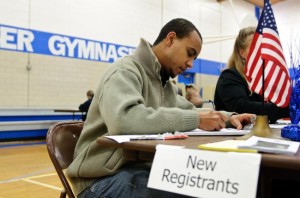Arizona Green and Libertarian parties file suit against new voter registration forms

On December 29th, the Arizona Green and Libertarian parties filed a lawsuit in the US District Court of Arizona charging that the state's new voter registration forms violate their First Amendment right to freedom of association and their Fourteenth Amendment right of equal protection under the law.
The state's former voter registration forms included a box prompting registrants to specify their party preference by writing that name in the space provided. In the most recent session of Arizona's legislature, however, lawmakers changed the design. In the party preference section on the new form, voters are prompted to check one of three boxes: the first is labeled Republican, the second is labeled Democrat and the third is labeled 'Other.' Underneath the 'Other' label, a small space is provided for registrants to write in the name of their party preference if it is other than Democrat or Republican.
The lawsuit alleges that the form now discriminates against the state's minor parties by privileging the Democrats and Republicans.
“This change has the sole effect of benefiting the Republican and Democratic Parties, and disadvantaging the Libertarian and Green Parties. It suggests the first two options to the future voter, while omitting all mention of the latter parties,” the suit charges.
The suit further states that when plaintiff Steve Lackey, a member of the Arizona Libertarian Party, attempted to register as a Libertarian at the Department of Motor Vehicles, “personnel there refused to allow him to do so, in the belief that “Other” referred to Independent, and not any third party.” In practice, the new form thus abridges the right to free association as it does not provide equal protection to all ballot qualified parties.
“Being listed on the form is especially important for the smaller qualified parties, because the main method they use to remain on the ballot is to maintain registration of two-thirds of 1%,” writes ballot access expert Richard Winger at Ballot Access News.
One of the sponsors of the language instituting the change, state Sen. Frank Antenori, R-Tucson, effectively admitted to the substance of the charge in making the case for the new format. Antenori said people were leaving the write-in space to specify their party preference blank, perhaps out of forgetfulness, and are thus being registered as Independent or unaffiliated even though they may indeed have a party preference, according to a report in the Arizona Daily Sun.
Antenori defended the format of the new form on the ground that there is not enough room on the sheet to accommodate all parties. “They didn't want 15 million party boxes on there because there's no room," he told the Sun. Of course, there aren't 15 million parties in Arizona. Only five parties have met all the standards for official recognition by the state and are fully ballot qualified: the Republican, Democratic, Green and Libertarian Parties , as well as the newly formed upstart political organization Americans Elect.
Given the rate at which Arizonans are leaving the Democratic and Republican parties, it is reasonable to assume that the change to the registration form was intended to bolster their membership rolls. Indeed, Independents now outnumber Democrats in the state. As of last July, 32.5% of the state's voters specified no party preference. 31.1% were registered with the Democratic party and 35.4% were registered Republican. Just under 1% of the state's voters are registered Libertarian or Green.
This represents a massive shift in registration patterns from just over a decade ago. In the year 2000, 43% of the state's voters were registered Republican, 38% were registered Democratic, and only 18% specified no party preference on their registration forms.
If we are to believe lawmakers such as Sen. Antenori, then over 600,000 Arizonans, around 19% of the state's registered voters, have “forgotten” that they are Democrats or Republicans over the last twelve years. Antenori told the Sun that he would be open to changing the offending legislation in the state's next legislative session.




